Saturday, May 10,2025. Annette’s Roundup for Democracy.
Trump started with deportations.
By using existing laws and manipulating the political system to destroy American democracy and institutions, Trump is trying to establish a dictatorship.
By wrapping his arms around what he claims is antisemitism as a rallying call, and bringing on board a few Jewish collaborators to stand with him, Trump has warded off consistent and powerful criticism and resistance of his fascism at the level it deserves. People fail to see that his behavior mirrors Hitler’s, because he claims to champion the Jews.
Antisemitism is Trump’s cover.
Here is one such collaborator 👇 - a sociopath who has obsessed against “foreigners” since he was a boy. Stephen Miller began expressing anti-immigrant and nativist views as early as middle school, around age 14. At that time, he ended a friendship with a Latino classmate explicitly because of his ethnicity, citing it as a reason for no longer being friends.
Many years ago, I worked with psychotic boys ages 11-14 in an institution for mentally ill children. A number of boys at the hospital, usually smaller and frightened boys, had consistent and shared hallucinations, that they were protected by larger and more powerful friends, who wore full Hitler regalia and stood by them, to protect them.
Miller’s grandparents were Holocaust survivors. Perhaps he was such a frightened child? Did he create a psychotic cover to deal with his fears, a variation of the projections invented by hospitalized boys with Nazi friends to keep them safe?
If you become a Nazi yourself, will you be safe?
Stephen Miller: "The writ of habeas corpus can be suspended in a time of invasion. So I would say that's an option we're actively looking at." pic.twitter.com/C4JC1ZO0Zx
— The Bulwark (@BulwarkOnline) May 9, 2025
“The Constitution is clear, and that, of course, is the supreme law of the land, that the privilege of the writ of habeas corpus can be suspended in time of invasion," Miller answered.
"So, it's an option we're actively looking at," he continued.
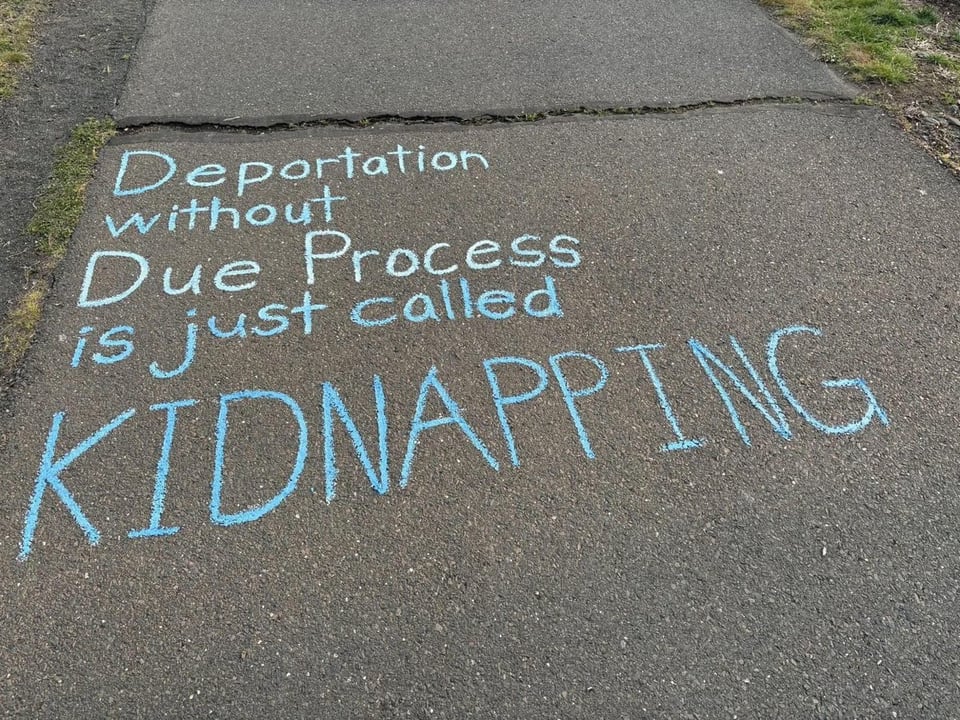
One more thing.
Trump’s stormtroopers are at work.
Why are these federal agents wearing face coverings? Is that policy now?pic.twitter.com/0AW2RjyPQY
— Molly Ploofkins (@Mollyploofkins) May 9, 2025
Columbia University student Mohsen Mahdawi is fighting against his possible deportation after being detained by ICE and then released by a judge. The Trump administration wants to deport him, saying his presence has "foreign policy consequences." His lawyers say he was detained… pic.twitter.com/oIqS0XFZwV
— PBS News (@NewsHour) May 9, 2025
Newark Mayor Ras Baraka (D) was arrested by federal officials Friday during a protest at a newly opened immigration detention facility in his city, officials said. https://t.co/uNikVkR7CU
— The Washington Post (@washingtonpost) May 9, 2025
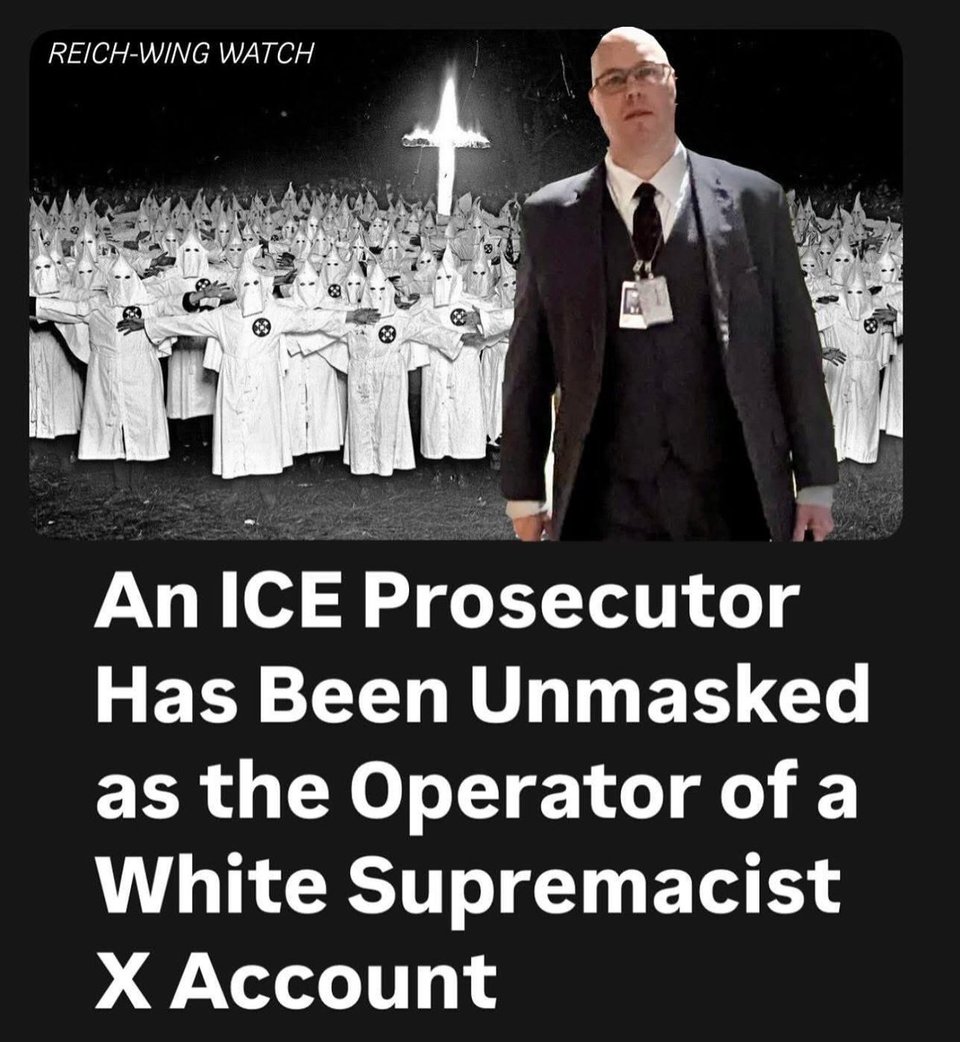
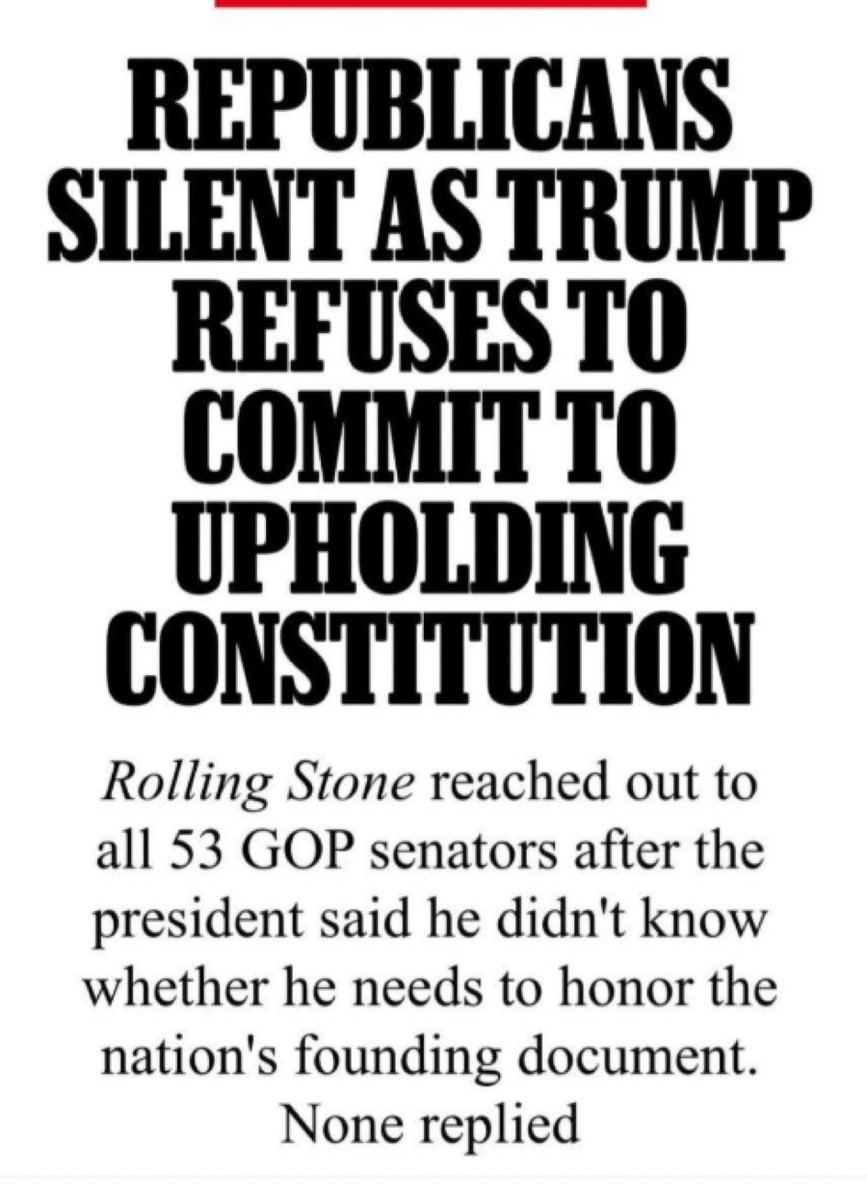
Call every elected official you can think of. Call for Due Process and Democracy. Fight now!
Here was one success.
Federal judge orders immediate release of Tufts University student Rümeysa Öztürk after six weeks in Louisiana immigration detention center https://t.co/rKiD6DiTWx
— CNN Breaking News (@cnnbrk) May 9, 2025
Correction.
From the brother of Pope Leo.
“In the immediate term, though, there was one important fact to clear up. The pope, Mr. Prevost said, was not a fan of the Chicago Cubs, as some had reported. He had always cheered for the White Sox. (New York Times)
From the White Sox.
"We're glad to have a White Sox fan at the Vatican... the Pontiff is always welcome at his ballpark."
Then they posted this on their ScoreBoard.👇
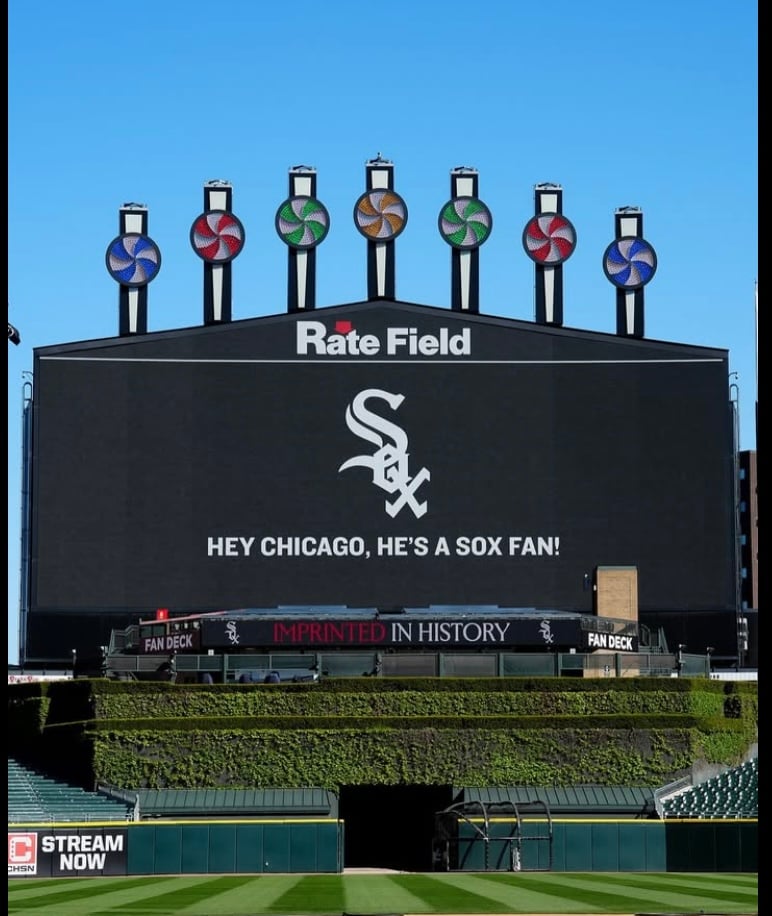
One more thing.
The Pontiff’s ancestors were Black. He may not know.
“The family does not identify as Black.”
New Pope Has Creole Roots in New Orleans
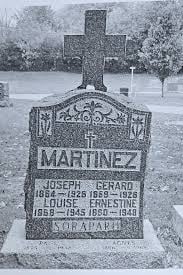
Image of a grave marker in Chicago for members of the Martinez family, including the new pope’s grandparents.Credit...via Jari C. Honora.
His ancestry, traced to a historic enclave of Afro-Caribbean culture, links Leo XIV to the rich and sometimes overlooked Black Catholic experience in America.
Robert Francis Prevost, the Chicago-born cardinal selected on Thursday as the new pope, is descended from Creole people of color from New Orleans.
The pope’s maternal grandparents, both of whom are described as Black or mulatto in various historical records, lived in the city’s Seventh Ward, an area that is traditionally Catholic and a melting pot of people with African, Caribbean and European roots.
The grandparents, Joseph Martinez and Louise Baquié, eventually moved to Chicago in the early 20th century and had a daughter: Mildred Martinez, the pope’s mother.
The discovery means that Leo XIV, as the pope will be known, is not only breaking ground as the first U.S.-born pontiff. He also comes from a family that reflects the many threads that make up the complicated and rich fabric of the American story.
The pope’s background was unearthed Thursday by a New Orleans genealogist, Jari C. Honora, and confirmed to The New York Times by the pope’s older brother, John Prevost, 71, who lives in the Chicago suburbs.
“This discovery is just an additional reminder of how interwoven we are as Americans,” Mr. Honora said in a text message late Thursday. “I hope that it will highlight the long history of Black Catholics, both free and enslaved, in this country, which includes the Holy Father’s family.”
It’s unclear whether the new pope has ever addressed his Creole ancestry in public, and his brother said that the family did not identify as Black. The announcement of his election in Rome focused on his early life in Chicago and decades of service in Peru.
Mr. Honora, who works at the Historic New Orleans Collection, a museum in the French Quarter, began investigating the pope’s background because of his French-sounding name, Prevost, but quickly found connections to the South instead.
His trail of evidence linking Leo to New Orleans includes the grandparents’ marriage certificate from their Seventh Ward wedding in 1887, a photo of the Martinez family grave marker in Chicago, and an electronic birth record of Mildred Martinez that shows she was born in Chicago in 1912.
The birth record lists Joseph Martinez and “Louis Baquiex” as Mildred’s parents. The father’s birthplace is listed as the Dominican Republic; the mother’s, New Orleans.
Mr. Honora also found records from the 1900 Census that list Mr. Martinez as “Black,” his place of birth as “Hayti,” and his occupation as “cigar maker.” Mr. Martinez’s details appear on the sixth line of a page of the census that Mr. Honora shared with The Times.
“Both Joseph Norval Martinez and Louise Baquié were people of color, no doubt about it,” Mr. Honora said.
Joseph Martinez’s exact place of birth remains a bit of a mystery — Mr. Honora also found an 1870 Census record that says the pope’s maternal grandfather was born in Louisiana. But he said it was not uncommon for people to change their responses on officials records.
Joseph Martinez and Louise Baquié married at Our Lady of the Sacred Heart in New Orleans. Until it was destroyed by a hurricane in 1915, the church building was on Annette Street in the city’s Seventh Ward, a historic center of Afro-Creole culture.
Creoles, also known as “Creole people of color,” have a history almost as old as Louisiana. While the word Creole can refer to people of European descent who were born in the Americas, it commonly describes mixed-race people of color.
Many Louisiana Creoles were known in the 18th and 19th centuries as “gens de couleur libres,” or free people of color. Many were well educated, French-speaking and Roman Catholic.
Over the decades, they established a foothold in business, the building trades and the arts, particularly music, with significant contributions to the development of jazz. They continue to be an important strand in the city’s famously heterogeneous culture.
The revelation of the new pope’s heritage is a tremendous moment for the history of Louisiana Creoles, said Lolita Villavasso Cherrie, a co-founder with Mr. Honora of The Creole Genealogical and Historical Association.
“I hate to say it, but we feel, many of us, that our history was hidden from us,” said Ms. Villavasso Cherrie, 79, a retired teacher. In part, she said, that’s because many Creoles have been able to “pass” as white over the years.
It was only with the advent of the internet, she said, that many people began to research their family history and became aware of their Creole roots. She noted that a significant number of Louisiana Creoles migrated to the Chicago area in the 20th century.
John Prevost, the pope’s brother, said that their paternal grandparents were from France, and that his father had been born in the United States. He said he and his brothers didn’t discuss their Creole roots.
“It was never an issue,” John Prevost said.
What all of this means, when it comes to the pope’s racial identity, touches on some of the thorniest questions in U.S. society, but also reflects the rich diversity of the American experience.
“We are all just a few degrees (or less than a few degrees) removed from each other,” said Mr. Honora, the genealogist. (New York Times)
_______________________________________________________
Pope Leo XIV. An American as unlike Trump as possible.
Did the College of Cardinals do this on purpose?
An American Pope Emerges as a Potential Contrast to Trump on the World Stage
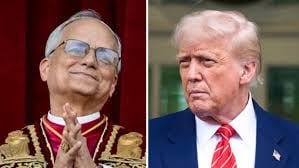
Pope Leo XIV’s focus on refugees and his pluralistic background may offer a different view of U.S. values from the president’s America First approach.
Cardinal Robert Francis Prevost’s ascension to the papacy marks an extraordinary moment for American leadership on the world stage at a time when President Trump has transformed the country’s reputation abroad and fueled distrust among longtime allies.
But while two Americans now sit in positions of enormous global influence, Pope Leo XIV may offer the world a different view of U.S. values from Mr. Trump’s America First approach, which he has executed through stiff tariffs, imperialist musings and vast cuts to foreign aid.
When he was introduced to the world, the new pope — who speaks five languages and is a naturalized citizen of Peru — emphasized his pluralistic background, making a point of speaking in Italian (representing his new constituency) and Spanish (his old one). He spoke no English and made no reference to the United States, even as some Catholics in St. Peter’s Square excitedly waved U.S. flags. (On Friday, he spoke briefly in English when he delivered his first homily.)
There are indications that the first American pontiff disapproves of some of the Trump administration’s hard-line stances. A social media account under his name has reposted messages critical of the president’s positions on issues including immigration, gun control and climate change. In February, the account shared a link to an article in The National Catholic Reporter titled “JD Vance Is Wrong: Jesus Doesn’t Ask Us to Rank Our Love for Others.”
“We have this powerful moral voice that is going to be able to potentially confront the other most powerful American voice,” said Charlie Sykes, an anti-Trump conservative who is Catholic. “Donald Trump bestrides the world as the ugly American, and now we have another prominent American who is able to confront him.”
Mr. Sykes said Pope Leo’s advocacy on behalf of migrants, in particular, could challenge Mr. Trump, who has pursued an aggressive campaign to deport them as quickly as possible.
“Part of Donald Trump’s appeal is that he is the great champion of Christendom and now he’s going to have to explain that to a fellow American who is the pope,” Mr. Sykes said. “There are very few, if any, figures that have the platform and the voice of the Holy See.”
John Prevost, the pope’s brother, told The New York Times in an interview that he did not think his brother would shy away from voicing his disagreements with the president.
“I know he’s not happy with what’s going on with immigration,” he said. “I know that for a fact. How far he’ll go with it is only one’s guess, but he won’t just sit back. I don’t think he’ll be the silent one.”
Still, Vatican analysts say Pope Leo is more reserved than his predecessor, and while they expect him to continue to defend migrants and the poor, some do not expect him to do so in as outspoken a manner as Pope Francis.
Mr. Trump and his supporters have also found aspects of the new pope’s background that excite them, including his ardent anti-abortion advocacy and his opposition to a government plan in Peru to add teachings on gender in schools.
“He’s said and done some mixed things in the past,” said John Yep, the chief executive of Catholics for Catholics, a group that supports Mr. Trump. “Let’s see how he does. I don’t want to rush to judgments right off the bat.”
In the hours since Pope Leo’s selection, the president has had only praise for the church’s new leader. Mr. Trump and Vice President JD Vance both congratulated him in posts on social media and celebrated his American heritage.
“The president made his reaction to Pope Leo’s announcement yesterday very clear,” Karoline Leavitt, the White House press secretary, told reporters on Friday when asked about the pope’s comments. “He’s very proud to have an American pope.”
It is unclear if either Mr. Trump or Mr. Vance had been aware of Pope Leo’s criticism of their policies, but some of the president’s most strident supporters have already registered their displeasure.
“He is anti-Trump, anti-MAGA, pro-open Borders, and a total Marxist like Pope Francis,” Laura Loomer, the far-right activist who has persuaded Mr. Trump to fire some of his aides for not being loyal enough, wrote on X. “Catholics don’t have anything good to look forward to. Just another Marxist puppet in the Vatican.”
Representative Nancy Pelosi, the former House speaker and a devout Catholic, praised Pope Leo’s commitment to the poor and said she hoped he could unite American Catholics across partisan divides.
“His values-based vision for the church is quite different from what we’re seeing from some leaders, if you call them that, in our country, but I don’t expect him to be engaged in a political debate with the president of the United States,” she said in an interview.
Even though Pope Leo is an American by birth, he has spent most of his adult life outside the country, and now as the head of state of another nation, it remains to be seen what relationship he will have with the United States. Pope Francis, who hailed from Argentina, never returned to his place of birth after becoming the church’s leader.
American cardinals said at a news conference on Friday that Pope Leo’s American identity was not a factor in his selection. When he was announced, the Vatican made no mention of his U.S. nationality, instead introducing him as the second pope from the Americas.
Cardinal Wilton Gregory, the archbishop emeritus of Washington, D.C., said the conclave was not seen as a “continuation of the American election.”
“It wasn’t an election conclave,” he said. “It was a desire to strengthen the Christian faith among God’s people.”
Joe Donnelly, the U.S. ambassador to the Holy See during the Biden administration, said Pope Leo’s selection transcended any nationality, but would also serve to demonstrate American values on the world stage.
“I think Pope Leo will be a wonderful reflection of America, of Chicago and all of our hardworking people,” Mr. Donnelly said. “He is a prototype of the American success story, working hard, studying hard and being kind to others.”
The cardinals’ selection of an American pope defied the prevailing belief that the church would not choose a leader from the global superpower. In the days leading up to the conclave, Catholic commentators speculated that Mr. Trump’s disruption of the global political and economic order made a U.S.-born pope even more unlikely.
Some analysts have posited that the cardinals selected Pope Leo precisely because of Mr. Trump. The president agitated many Catholics, even some of his allies, when he posted an A.I.-generated image of himself dressed as the pope after Pope Francis died.
“The president might well be right to claim credit for the selection, at least in part, given the photo he posted on social media,” said Rocco Palmo, a Catholic church analyst. “The choice of Leo is the cardinals’ way of saying, ‘This is our process and we decide what is Catholic, not the White House.’”
(New York Times).
Happy Mother’s Day all.
Mothers Day hits different for many of us. Many have strained relationships with their moms, some wish they still had their mom's... no matter the relationship, I wish all the moms a happy mother's day especially my mom and to all those who are without their mom's this year, my heart is with you. 🫶🏽
— Harry Dunn (@libradunn1.bsky.social) 2025-05-10T00:23:10.849Z